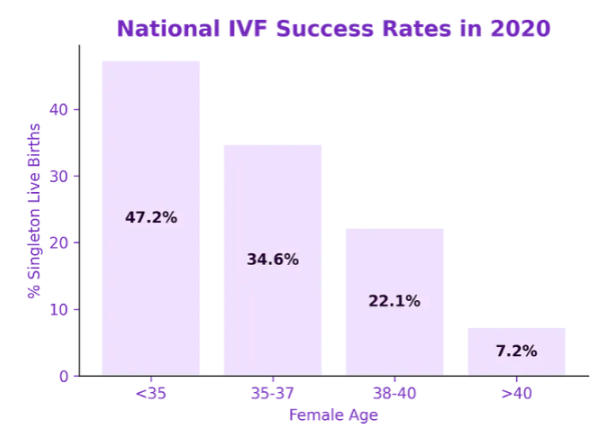

THE STRUGGLES THAT WILL LEAD TO SUCCESS IS PART OF THE JOURNEY.

The American Fertility California Corp (AFMC) defines success in different areas. Our ultimate goal is to place your baby into your arms, as you’ve already had them placed in your heart long before they arrived. Beyond that, AFMC also focuses on the smaller strides through your fertility journey.
At this point, most women are aware that age affects one’s ability to get pregnant and even with the help of in vitro fertilization, the pregnancy and live birth rates decrease as women get older.
However, the outcomes are much better using IVF than naturally or with IUI and it’s possible for women in their late 30’s and early 40’s to conceive using their own eggs.
Successful IVF outcomes are generally higher in younger women, averaging around 40% globally. This likelihood of success increases even more for those under 35 years old. The success of ART is measured by Live Birth Rates, which is the number of live births per embryo transfer.
IVF success rates in the US are similar to global rates. Some clinics like ours at AFMC are one of the best in the US.
Source: IVF success rates by age in the United States for all IVF cycles started in 2020 that resulted in the birth of a single baby. This data is women using their own eggs for IVF treatment. Data sourced from the CDC ART reporting released in 2022.
In this chart, we’re looking at all cycles for the year of 2020 for women using their own eggs for treatment, so these success rates don’t include donor eggs.
IVF success rates have increased slightly for each age group since the previous reporting year, which is very encouraging!
IVF Success Rates by Age
These success rates include all cycles in 2020 where: women used their own eggs for IVF treatment a single baby was born from the pregnancy (doesn’t include success rates for twins, triplets, etc) all IVF cycles started (includes cycles canceled partway due to poor medication response, no eggs retrieved, etc)
In cases where women are not able to get good quality embryos using their own eggs, they may opt to use donor eggs from a younger woman, as the better egg quality is more likely to lead to viable embryos. We’ll talk more about donor egg success rates later on.
We also used the success rates that include the small percentage of cycles that were canceled after starting medications, sometimes due to a poor medication response or no eggs being retrieved. This gives a more realistic view of the success rates, it could be you that has to cancel, so better to factor that in when looking at the averages.

Contact us today!